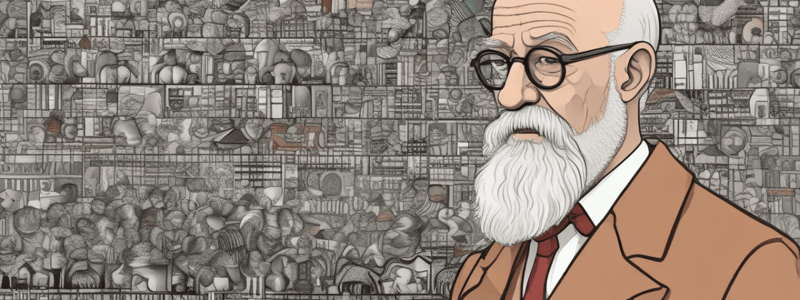Podcast
Questions and Answers
What did Durkheim aim to prove by studying suicide?
What did Durkheim aim to prove by studying suicide?
- That psychological factors are more important than social factors
- That individual actions are solely determined by personal motives
- That sociology has a unique subject matter and can be a scientific discipline (correct)
- That protestants are inherently more likely to commit suicide than Catholics
According to interpretivists, what is the primary focus of sociology?
According to interpretivists, what is the primary focus of sociology?
- Studying social facts
- Observing physical science phenomena
- Analyzing statistical patterns
- Understanding meaningful social action (correct)
How do interpretivists view the relationship between natural science and sociology?
How do interpretivists view the relationship between natural science and sociology?
- Sociology studies conscious beings while natural sciences do not (correct)
- Natural sciences can explain sociology completely
- There is no fundamental difference between the two
- Sociology should adopt methods from natural sciences
What method did Weber suggest for understanding the meanings behind human actions?
What method did Weber suggest for understanding the meanings behind human actions?
What do interactionists prefer over having a definitive hypothesis before conducting research?
What do interactionists prefer over having a definitive hypothesis before conducting research?
How do phenomenologists and ethnomethodologists view society?
How do phenomenologists and ethnomethodologists view society?
What was G.H. Mead's argument regarding human response to external stimuli?
What was G.H. Mead's argument regarding human response to external stimuli?
What methodology does Jack Douglas advocate for understanding the meanings behind suicide?
What methodology does Jack Douglas advocate for understanding the meanings behind suicide?
How does Atkinson's view on the 'real rate' of suicide differ from Douglas's?
How does Atkinson's view on the 'real rate' of suicide differ from Douglas's?
Why do postmodernists argue against the scientific approach in sociology?
Why do postmodernists argue against the scientific approach in sociology?
What is a key criticism poststructuralist feminists have against a single, scientific feminist theory?
What is a key criticism poststructuralist feminists have against a single, scientific feminist theory?
What fallacy does Karl Popper associate with inductive reasoning?
What fallacy does Karl Popper associate with inductive reasoning?
What is falsificationism according to Karl Popper?
What is falsificationism according to Karl Popper?
Which example does Karl Popper use to illustrate the fallacy of induction?
Which example does Karl Popper use to illustrate the fallacy of induction?
What, according to Popper, is the defining characteristic of scientific methods?
What, according to Popper, is the defining characteristic of scientific methods?
Which feature does NOT describe a good theory according to Popper?
Which feature does NOT describe a good theory according to Popper?
Why does Popper believe science grows rapidly?
Why does Popper believe science grows rapidly?
What is a key reason Popper judges much of sociology as unscientific?
What is a key reason Popper judges much of sociology as unscientific?
According to Kuhn, what is a paradigm?
According to Kuhn, what is a paradigm?
Which activity best describes 'Normal Science' as per Kuhn?
Which activity best describes 'Normal Science' as per Kuhn?
Why does Kuhn argue that a science cannot exist without a shared paradigm?
Why does Kuhn argue that a science cannot exist without a shared paradigm?
What is the biggest advantage of a paradigm according to Kuhn?
What is the biggest advantage of a paradigm according to Kuhn?
How does Kuhn describe scientific revolutions?
How does Kuhn describe scientific revolutions?
According to the content, when can sociology become a science?
According to the content, when can sociology become a science?
What do realists believe about the nature of systems sociologists study?
What do realists believe about the nature of systems sociologists study?
What does Kuhn believe is the primary activity of scientists within a paradigm?
What does Kuhn believe is the primary activity of scientists within a paradigm?
What is a key characteristic of closed systems as highlighted by Keat and Urry?
What is a key characteristic of closed systems as highlighted by Keat and Urry?
How do Kuhn's views of science contrast with Popper's?
How do Kuhn's views of science contrast with Popper's?
What type of system allows a researcher to control and measure relevant variables?
What type of system allows a researcher to control and measure relevant variables?
Which perspective argues that sociology studies open systems where precise predictions are difficult?
Which perspective argues that sociology studies open systems where precise predictions are difficult?
According to Keat and Urry, which of the following is NOT true about science?
According to Keat and Urry, which of the following is NOT true about science?
What term refers to making precise predictions in systems where researchers can control variables?
What term refers to making precise predictions in systems where researchers can control variables?
Which of the following best describes an open system as studied by sociologists?
Which of the following best describes an open system as studied by sociologists?
Realists argue that social science attempts to explain the causes of events through what?
Realists argue that social science attempts to explain the causes of events through what?
According to Realists, what is a major difference between natural science and sociology?
According to Realists, what is a major difference between natural science and sociology?
What concept disputes the idea that science is only concerned with observable phenomena?
What concept disputes the idea that science is only concerned with observable phenomena?
For Durkheim, what are 'social facts'?
For Durkheim, what are 'social facts'?
What does the term 'Verstehen' mean in sociology?
What does the term 'Verstehen' mean in sociology?
What is a key belief of positivists regarding reality?
What is a key belief of positivists regarding reality?
What method do positivists primarily use to discover patterns in society?
What method do positivists primarily use to discover patterns in society?
Which sociologist studied suicide to demonstrate that sociology is a science with its own subject matter?
Which sociologist studied suicide to demonstrate that sociology is a science with its own subject matter?
What is the main goal of positivists when conducting research?
What is the main goal of positivists when conducting research?
What type of data do positivists prefer to use in their research?
What type of data do positivists prefer to use in their research?
What term is used to describe the positivist belief in confirming theories through repeated observations?
What term is used to describe the positivist belief in confirming theories through repeated observations?
Which of the following is a feature of objective quantitative research according to positivists?
Which of the following is a feature of objective quantitative research according to positivists?
Flashcards are hidden until you start studying
Study Notes
Interpretivism in Sociology
- Interpretivists argue that the subject matter of sociology is meaningful social action, and they need to interpret meanings and motives to understand social behavior.
- They believe that there are unobservable internal meanings that influence individual behavior.
- Interpretivists reject the idea that sociology is a science, and they argue that natural science methods cannot be applied to sociology.
- They emphasize the difference between natural science and sociology, as humans have consciousness and make sense of their world by attaching meanings to it.
Verstehen and Qualitative Research
- Verstehen is a method used to discover the meanings people give to their actions, which involves seeing the world through their eyes.
- To understand the meanings, researchers must abandon detachment and objectivity and use qualitative methods, such as participant observation.
- This approach produces richer, more personal data, resulting in higher validity.
Types of Interpretivism
Interactionists
- Interactionists have casual explanations and reject the positivist view of having a definitive hypothesis before research.
- They prefer a "bottom-up" approach, where ideas emerge gradually from observations made during research, producing testable hypotheses after the research.
Phenomenologists and Ethnomethodologists
- They reject the possibility of causal explanations and take an anti-structuralist view, where society is not a real thing "out there" determining our actions.
- They believe that social reality is simply shared meaning/knowledge of members.
- Sociology can only consist of interpretive procedures.
Interpretivism and Suicide
- Jack Douglas (1967) rejects the positivist idea of external social facts determining behavior, and instead, emphasizes the importance of understanding the meanings for those involved in suicide.
- He proposes the use of qualitative data to reveal the actor's meanings.
Postmodernists, Feminism, and Scientific Sociology
- Postmodernists argue against scientific sociology, which they see as a meta-narrative that excludes other perspectives.
- They believe that the quest for a single, scientific feminist theory is a form of domination that excludes many female groups.
- They reject the idea that science is a desirable model for sociology.
What is Science?
- Interpretivists reject the positivist view of scientific sociology, but they agree with the description of natural sciences.
- Karl Popper argues that what makes science unique is falsificationism, which involves testing theories to prove them wrong.
- He believes that scientific knowledge is provisional and can be refuted at any moment.
Positivism
- Positivists believe that sociology can be a science, and they apply the logic and methods of natural sciences to the study of society.
- They believe that reality exists outside and independently of the human mind.
- They seek to discover laws that determine how society works, using induction and verificationism.
Falsificationism
- Falsificationism involves testing theories to prove them wrong.
- Good theories have two features: they are falsifiable and bold.
- For Popper, science is a public activity that thrives in open societies, where there is free expression and the right to challenge accepted ideas.
Implications for Sociology
- Popper believes that much of sociology is unscientific because it consists of theories that can't be put to the test.
- However, he believes that sociology can be scientific if it produces hypotheses that can be falsified.
Thomas Kuhn: Scientific Paradigm
- The paradigm is a shared framework of assumptions, principles, methods, and techniques that defines what a science is.
- In Kuhn's view, a science can't exist without a shared paradigm.
- Normal science involves puzzle-solving within a paradigm.
Scientific Revolutions
- Scientific revolutions occur when scientists gain results that conflict with the existing paradigm, leading to a decrease in confidence in that paradigm.
- This leads to debates about fundamental assumptions and eventually, the development of rival paradigms.
Implications for Sociology
- Sociology can only become a science if basic disagreements are resolved.
- Realists argue that sociology can be scientific, as it attempts to explain the causes of events in terms of underlying structures and processes.
- They believe that both natural and social science attempt to explain the causes of events in terms of underlying structures and processes.
Studying That Suits You
Use AI to generate personalized quizzes and flashcards to suit your learning preferences.




